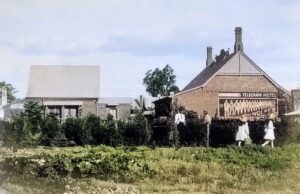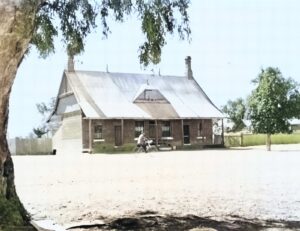In 1866, Matthew Good operated a boarding house, likely located in the same building that would later become the Telegraph Hotel. Good, an Irishman who had reportedly made his fortune during the Victorian goldfields boom, began acquiring several town allotments in Bourke in late 1867. His entrepreneurial spirit extended to various ventures, including involvement in the Cobar mining boom five years later.
By 1875, Matthew Good had constructed “a fine stone and brick edifice” on Mitchell Street, solidifying his presence in the rapidly growing town. This building was initially licensed as the Trafalgar Hotel, but was soon renamed the Telegraph Hotel, a name it would carry through its long and storied history.
During this period, the block between Sturt and Charles Streets rapidly developed, with various shops lining both sides, flanked by Tattersall’s Hotel at one end and the Red Lion Brewery at the other, with the Telegraph Hotel located in the middle of this vibrant scene.
The 1890 flood, a devastating event that collapsed Mr. Adolph’s store, also tested the resilience of the Telegraph Hotel. At the time, Arthur Meadows held the hotel’s license (1886–1891) and bore the full impact of the disaster. Despite the significant challenges, the Telegraph Hotel managed to persist, cementing its place in Bourke’s history.
In 1900, Charles Campbell assumed the lease and licence, guiding the hotel through the difficult tail end of a drought. Three years later, Francis (Frank) Tidmarsh became the licensee, attracting a loyal customer base, particularly through his involvement in various sporting organisations.
The hotel changed hands again in 1906, with L. S. Donohoe briefly holding the licence before it was taken over by Joseph Stanton Donohoe, a prominent businessman and former Mayor of Bourke. The latter Donohoe had previously run both the Family Hotel and the Gladstone Hotel, bringing his experience to the Telegraph. However, his tenure was tragically short. He died in 1908, and the hotel passed to his wife, Rebecca Donohoe, who, deeply grieving, died just fourteen months later in 1910.
After Rebecca’s passing, Thomas Rice took over and embarked on much-needed renovations of the ageing hotel. However, his time as licensee was marred by a legal issue in 1911 when he was fined for selling brandy that was deemed unfit for consumption. Rice’s own story ended tragically when he died of typhoid in 1914, still holding the licence.
The Good family, who had been instrumental in the hotel’s early days, faced their own personal tragedies. Matthew Good, the original builder of the Telegraph Hotel, had retired after a long career but struggled with illness and blindness before passing away in 1909. His son, Frank Good, who had also managed the hotel, ended his life in 1914, overwhelmed by business troubles and the eye problems that had similarly afflicted his father.
Despite these personal losses, the Telegraph Hotel continued operating under Joseph Barry, who took over in 1915. However, in 1924, as part of a wider governmental effort to reduce the number of hotel licences in New South Wales, the Telegraph Hotel was delicensed, marking the end of its long and storied chapter in Bourke’s history.
Read more about the Telegraph Hotel in Bruce Gray’s colourful account.

The Pubs & Breweries of Bourke
From its earliest days Bourke has always had a reputation as a drinking town and it’s no wonder as it was, in fact, founded by publicans!



